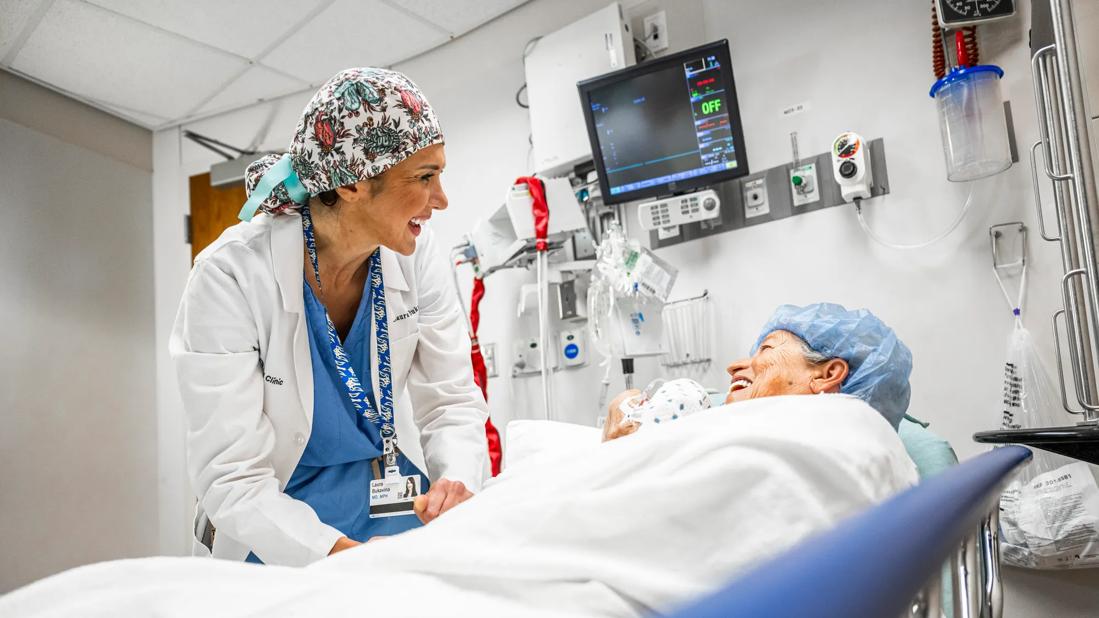Findings confirm microbial variability, offer new potential treatment strategy

Image content: This image is available to view online.
View image online (https://assets.clevelandclinic.org/transform/b4d068d8-08d0-48f4-8a8b-df26881ce26e/URL_5202236_08-29-24_049_MLC)
Dr. Bukavina smiles at patient in hospital bed
A new study by Cleveland Clinic scientists has found that differences in the urinary microbiomes of bladder cancer patients can influence how chemotherapy drugs are metabolized. Findings from the study were presented at the American Urological Association’s 2025 Annual Meeting.
Advertisement
Cleveland Clinic is a non-profit academic medical center. Advertising on our site helps support our mission. We do not endorse non-Cleveland Clinic products or services. Policy
Researchers found that, while most patients had microbiomes that did not interact significantly with chemotherapy, some were “hypermetabolizers,” with high levels of bacteria that could break down the drugs, potentially making them less effective. The findings are a step towards more personalized medicine, with treatment plans shaped by each patient’s microbial profile.
“By identifying microbial genes involved in drug metabolism, we can predict how well a patient might process certain chemotherapies,” says Cleveland Clinic urologic oncologist Betty Wang, MD, first author of the study. “This could guide drug selection or prompt microbiome-modifying strategies to enhance drug response or reduce side effects.”
The human microbiome can significantly influence the safety and efficacy of medications, for example, by neutralizing a beneficial compound by metabolizing it or creating harmful metabolites as a byproduct. This process is especially a concern in the treatment of bladder cancer, since medications sit in the bladder for an extended period of time, creating an opportunity for microbes to potentially reduce their effectiveness.
The new study builds on previous research by the team, which found that bladder cancer patients had microbial “signatures” that could be used to predict better or worse response to chemotherapy.
For the study, researchers analyzed urine samples from six patients who were receiving gemcitabine, a chemotherapy drug commonly used to treat bladder cancer, in a bladder-sparing clinical trial. Researchers conducted whole-genome sequencing on the samples to identify the classes, species, and strains of bacteria for each patient. These populations were then analyzed further to determine which bacteria had enzymes that could metabolize gemcitabine.
Advertisement
“The presence of certain bacteria that metabolize the drug as a nutrient source reduces the intravesical concentration of the chemotherapy drug, thereby limiting its availability to exert cytotoxic effects on bladder cancer cells,” explains senior author Laura Bukavina, MD, MPH, assistant professor of urologic oncology at Cleveland Clinic Glickman Urologic Institute. “It’s taking an active chemotherapy drug and making it inactive.”
The study confirmed significant variability in the microbiomes of the patients, Dr. Bukavina says. Researchers found that a few patients had little to no bacteria capable of breaking down gemcitabine, around half had a moderate amount of these bacteria, while 20% to 30% were “hypermetabolizers,” she says.
“What’s novel is that now we can use data that’s already available in many of these patients, without additional invasive tests,” Dr. Bukavina says. “A lot of patients get urine sequencing. Now we have a pathway where we can use that data and not just look at their tumor but also look at their microbiome in the same analysis and come up with a personalized signature of their microbiome.”
Treatment could involve treating the microbiome itself with broad-spectrum antibiotics or more targeted suppression, or it could mean selecting more compatible chemotherapy drugs, she says.
Researchers noted that their findings have implications beyond cancer treatment.
“Microbiome-based drug metabolism insights could be applied across many fields,” Dr. Wang says. “Modifying the microbiome may improve responses to a wide range of medications and reduce drug-related toxicities, even outside of oncology.”
Advertisement
Next, researchers plan to conduct follow-up research correlating patients’ microbial profiles with clinical outcomes. They also plan to study whether microbial profiles can be used to predict toxicity in patients with metastatic urothelial cancer being treated with a new antibody-drug conjugate.
Advertisement
Advertisement
Oncologic and functional outcomes are promising, but selection is key
Research program sets the stage for clinical trials
Retrospective study finds acceptable cancer control among most histologic subtypes with intravesical therapy
What updated techniques, counseling and a changing workforce could mean
A recent case study illustrates surgical intervention for treating recurrent bladder cancer
First full characterization of kidney microbiome unlocks potential to prevent kidney stones
Findings could help identify patients at risk for poor outcomes
Metabolites from animal product substrates implicated in heart failure development in community cohorts